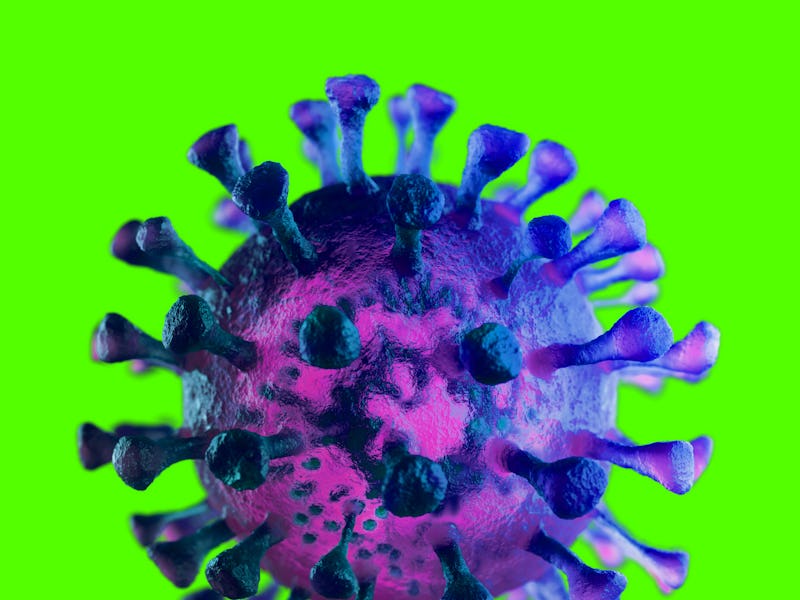Two sensory symptoms are warning signs of Covid-19 infection — study
"It is reasonable to self-isolate if you experience abrupt smell or taste dysfunction."

When the novel coronavirus emerged, the symptoms most associated with sick patients were high fevers, dry coughs, and difficulty breathing. These symptoms guided diagnosis and subsequent treatment throughout most of the pandemic.
Growing evidence suggests clinicians might have overlooked a key clue present before those hallmark symptoms hit: the sudden loss of smell or taste.
A study published Wednesday in the journal Neurology: Clinical Practice found this type of sensory dysfunction could be an early and reliable sign of Covid-19.
By tracking the symptoms of 93 Covid-19 patients admitted to an Italian hospital in March 2020, scientists discovered that nearly two-thirds of the group experienced losing their senses of smell and taste.
What was discovered — Twenty-two percent of those with an impaired sense of smell and taste reported it was their first symptom of infection. More systemic symptoms, like fever, typically followed 24 to 48 hours after the sensory symptoms first appeared.
These results suggest hyposmia and dysgeusia (the clinical terms for smell/taste dysfunction) are "central and key symptoms" that can aid an early diagnosis, study co-author Francesco Bax, tells Inverse. Bax is a neurology resident at Santa Maria della Misericordia University Hospital in Udine, Italy.
The team's latest paper jibes with other studies finding similar numbers on sensory dysfunction. Mayo Clinic researchers recently reported the prevalence of smell blindness or taste distortion in people positive for Covid-19 was 28.6 times higher than that seen in people who test Covid-19 negative. They concluded anosmia and/or dysgeusia was one of the earliest signs of the disease.
Evidence from recent studies is already informing a new clinical response to Covid-19, Bax explains.
"Smell and taste dysfunctions are now recognized as symptoms of the mild phase of Covid-19 infection," Bax says.
"This means that they are no more regarded as anecdotal observations like they were at the beginning of the pandemic, but rather as frequent and 'normal' infection symptoms."
Digging into the details – The team documented the symptoms of patients admitted to an Italian hospital during the month of March. These participants either tested positive for the virus with a swab test or showed signs of lung problems related to Covid-19 with a chest X-ray or scan. Scientists also interviewed participants about their symptoms.
Fifty-eight people, or 63 percent of the group, experienced loss of smell and taste. For 13 of the 58 participants (22 percent), the loss of smell and taste was their first symptom. On average, the loss of smell and taste lasted 25 to 30 days.
Why does Covid-19 cause the loss of smell and taste?
Only six of the participants reported nasal blockages, so Bax says it's unlikely an “obstructive” mechanism is causing the sensory problems.
Another possible mechanism may be direct damage caused by the virus while it makes its way through the olfactory nerve, Bax explains: "In fact, we hypothesize that these symptoms may be the clue to a route of entry of the virus other than the respiratory and gastrointestinal ones."
Curious about possible biomarkers of inflammation in the blood, the team also collected participants' blood samples in an attempt to explain the underlying mechanisms driving sensory dysfunction.
Compared to coronavirus-infected patients who didn't lose their sense of smell and taste, the people with a compromised sense of smell had about 23 percent lower amounts of white blood cells, called leukocytes. The same group experienced a 29 percent decrease in white blood cells called neutrophils, which help the body fight infection.
Lower white blood cells is a finding "more difficult to interpret," Bax says. It may represent transient viral-induced damage to the immune system. However, its relationship with smell and taste disorders is not clear.
It's still too early to say these drops in white blood cells are biomarkers for Covid-19, but the team says these fluctuations could point health providers in the right direction.
What's next — A relevant finding which could help health providers is that several patients presented smell or taste dysfunction before other clear Covid-19 symptoms, Bax explains.
"This evidence has a major implication, meaning that people who become aware of a reduced odor or taste perception may self-isolate and therefore curb the disease spread in the pre-symptomatic stage — a phase which has been associated with the highest infectivity," Bax says.
"It is reasonable to self-isolate if you experience abrupt smell or taste dysfunction and possibly get a nasal swab as soon as possible."
Based on the findings, the team writes smell and or taste loss should be considered as a "sentinel of an incumbent infection." Clinicians should use these sensory indicators to guide diagnosis, self-isolation, testing, and possible treatment.